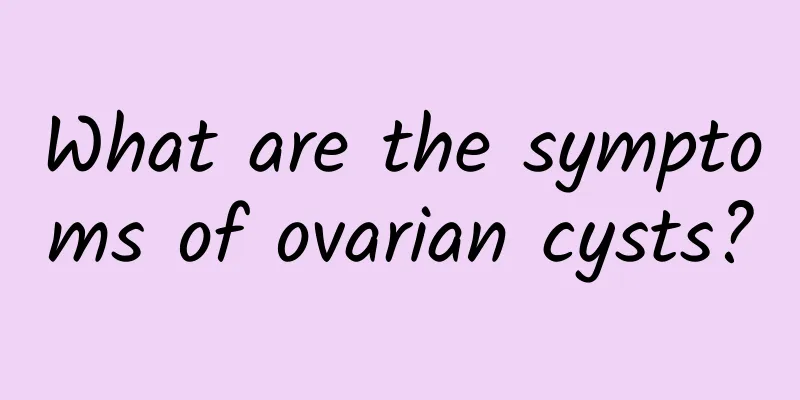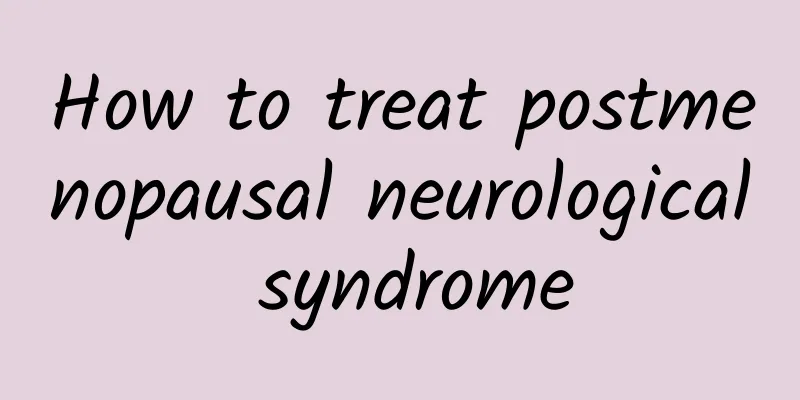What are the symptoms of ovarian cysts?

|
Ovarian cysts are common gynecological diseases in women, and may cause a variety of symptoms, including lower abdominal pain, menstrual abnormalities, abdominal masses, compression symptoms, abnormal vaginal discharge, etc. If you have any discomfort, it is recommended to seek medical attention in time and take appropriate measures under the guidance of a doctor. The details are as follows: 1. Lower abdominal pain: dull pain, distending pain or heavy pain in the lower abdomen. The degree of pain varies from person to person. If the pain is mild, you can observe and use painkillers to relieve it. If the pain is severe and accompanied by symptoms such as fever, surgical treatment may be required, such as cystectomy or oophorectomy. 2. Menstrual abnormalities: Menstrual cycle disorders may cause increased or decreased menstrual volume, prolonged or shortened menstrual period, etc. Endocrine regulation treatment can be performed for menstrual abnormalities, such as the use of hormone drugs to adjust the menstrual cycle. At the same time, depending on the nature and size of the cyst, it is decided whether surgical treatment of the cyst is needed. 3. Abdominal mass: A mass can be felt in the lower abdomen. The mass may vary in size and texture. Ultrasound and other tests are used to determine the nature and size of the mass. If the mass is small and benign, it can be observed regularly. If the mass is large or suspected to be malignant, surgical removal is usually required. 4. Compression symptoms: Frequent urination, urgency, difficulty urinating, or constipation, abdominal distension and other symptoms may occur. Relieving the compression is the key, and surgery is generally required to remove the cyst. Symptoms of the urinary or digestive system caused by compression can be gradually relieved after surgery. 5. Abnormal vaginal discharge: Increased vaginal discharge, color change, abnormal texture, and possibly accompanied by a strange smell. Antibiotics and other drugs can be used to treat pelvic inflammation. At the same time, ovarian cysts can be treated with surgery or conservative treatment depending on the situation. Ovarian cysts have various symptoms. When the above symptoms occur, you should seek medical attention for detailed examinations in time and take appropriate treatment measures after a clear diagnosis. At the same time, women should undergo regular gynecological examinations to detect and treat gynecological diseases such as ovarian cysts at an early stage. |
<<: At what age do women reach menopause?
>>: How to judge uterine prolapse 1st, 2nd and 3rd degree
Recommend
How to prevent cervical hypertrophy
The symptoms of cervical hypertrophy are not very...
What can't you eat after a miscarriage? Don't eat these 3 types of food
Abortion is equivalent to "postpartum confin...
How to check for premature ovarian failure
How to check for premature ovarian failure? Prema...
Treatment of endometrial tuberculosis
What is the treatment for endometrial tuberculosi...
What are the dangers of pelvic peritonitis in women?
In daily life, pelvic peritonitis is very common,...
Where does the danger of Bartholinitis come from?
Bartholinitis is a common disease in women. When ...
What is the cause of the cervical biopsy result showing squamous cell carcinoma? There are three possible results.
Female friends are more likely to suffer from cer...
How are uterine fibroids caused? Can female depression induce uterine fibroids?
Uterine fibroids (Hysteromyoma) Uterine leiomyoma...
Can you get pregnant with premature ovarian failure? What are the effects of premature ovarian failure on pregnancy preparation?
The ovaries are an extremely important reproducti...
Pelvic effusion: Avoid spicy and cold food
Experts say that physiological pelvic effusion us...
What can't you eat after an abortion? How long can you not eat before an abortion?
What can't you eat after abortion? Abortion i...
The hazards of two common chronic adnexitis
Chronic adnexitis is a gynecological disease with...
What causes premature ovarian failure at the age of 30?
Premature ovarian failure refers to premature ova...
TCM treatment of threatened abortion
From the perspective of traditional Chinese medic...
How long can I wash my hair after an abortion? How long can I wash my hair after an abortion?
When can I wash my hair after an abortion? This i...









